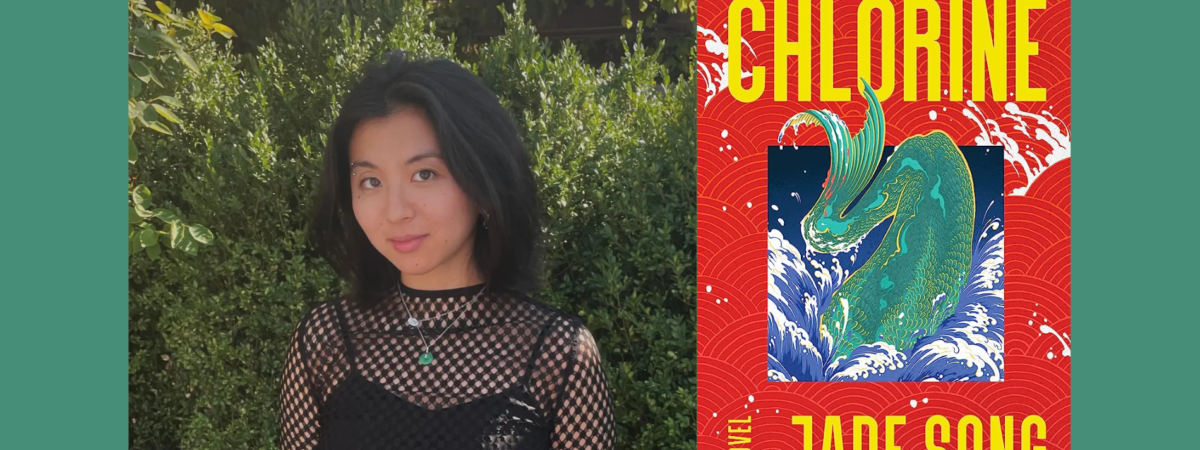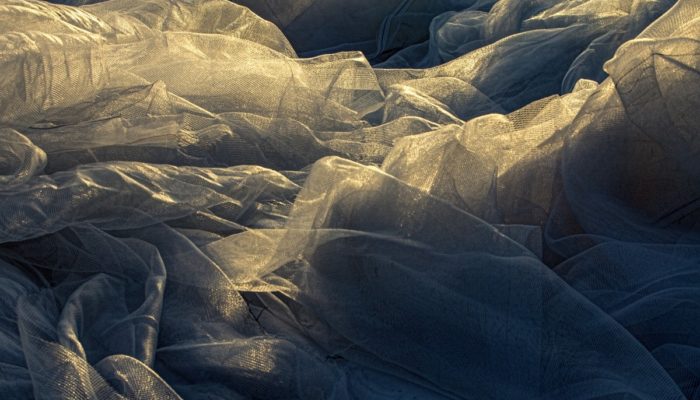I met Jade Song in 2020 through a writing group, not long after they’d started writing their debut novel, Chlorine. In alternating accounts between Ren, a competitive high school swimmer, and Cathy, her best friend, the novel puts the dark horrors of adolescence into sharp focus – with freedom only made possible through a life in the water. Imaginative, bold, and defiant, Chlorine is as mythical as it is unapologetically honest.
Ren’s ambitions as a swimmer rival that of her maker. Jade harbors an unparalleled dedication to sustaining a relationship with art, both as viewer and creator. In August, just one month after Chlorine’s UK release, I sat down with Jade to talk about mythical and human transcendence, developing a deliberate relationship with art and language, and staying true to who you are.
—JoAnna Mak
JoAnna Mak: In many ways, Chlorine is a novel about escaping the oppression of adolescence, including periods, girlhood, bullying, assault, and an abusive dynamic with a coach.
Ren frames her decision to become a mermaid as “transcendence” from her former humanity. What is transcendence to you, and how did you arrive at this term to frame Ren’s evolution?
Jade Song: Ren’s idea of transcendence is totally different from what I personally think it is. As a human, it’s about deciding to be your true self–one that isn’t condemned by any rules that humans or society have placed on you. That doesn’t mean shedding any kind of care for other people. Care and love and mutual human connection are really important, and that means balancing what other people expect from you and what you want from them, and what you can give.
I still have to be a human, but Ren can become a mermaid because she’s a fictional character. She’s literally a myth, and she can be anything she wants. And to me that’s transcendence, because she doesn’t have to be a stupid human anymore. There’s been some debate about whether she’s really a mermaid, or if it’s just mental illness. And maybe it’s both of those, but that’s what’s so fun about novels. She can really be anything.
JM: Would you say art and artmaking are forms of transcendence for you?
JS: If transcendence is the idea that you can do and become anything you want, while being conscious of the care and community you want to keep in your life, then art is a manifestation of that. Sometimes we have desires we can’t necessarily know yet, or we don’t yet have the courage to believe in. So art and artmaking become this outlet where you can vocalize your desires. And once you vocalize those desires, you can understand them and make them real, which is a form of transcendence in itself.
JM: In an interview with Fantasy Hive, you talked about how Chlorine is, in a way, a novel about athletic delusion. How does your background as a competitive swimmer influence your approach to writing?
JS: I find them very similar. With writing, you have to sit down and believe you’ll write out this sentence and it’ll be worthwhile. With competitive swimming, you have to keep swimming back and forth in the same 25 yards or 50 meters, and believe it’ll lead to one dropped second on your time. And that story you just told, that second dropped–nobody else cares. It’s the least level of stakes ever, but it means everything to you, and that level of delusion is fascinating.
JM: When you’re just learning to write, people often recommend taking workshops as a way to strengthen your craft. But you developed your writing practice through extensive reading, especially outside the Western canon.
Was there a reason you opted against a “formal” writing education, or was it just what felt right at the time?
JS: It was a bit of both. I never did that well in formal education spaces. Growing up, I was pissed off that someone was telling me what to read, when I knew what I wanted to read. It’s not that I opted out; I knew what I was more comfortable with, and that was reading and writing and hanging out with my friends who also like to read and write. And that was a form of education in itself.
JM: That makes a lot of sense–you’re the most prolific reader and writer I know. Which books have influenced you the most when it comes to craft?
JS: I loved Craft in the Real World [by Matthew Salesses]. I read it when I was first drafting Chlorine, and it helped me realize that a lot of the unconscious decisions informing what I was writing and reading were actually being made conscious through those very actions. Being deliberate in what you’re trying to say and how you’re trying to say it, and with how you represent people, all became more important for me after reading that book.
But in a way, everything I read is a craft lesson–whether it’s fanfiction on Archive of Our Own or a Russian literature tomb. It’s beautiful that one can sit and read stories, and learn the way people tell stories, which then informs your own. It’s like there’s a long, everlasting lineage of stories.
JM: I really love that. I think there’s a lot of that in storytelling.
In previous interviews, you’ve spoken about how you wrote Chlorine from a place of anger, and how your current novel-in-progress is being written from a place of love. I wanted to ask about your writing style. How has it changed–or remained the same–since your first book?
JS: I’m much more conscious of how my sentences sound and what they’re saying. When I first started writing, I was like, I can say whatever I want to say, nobody should care. And in a way that’s still true. But word choice and how characters are represented are important craft decisions that hold a lot of weight and responsibility. I know some writers don’t care about the reader at all, but if you extract the reader from this argument, you can still make the argument that the writer should care what each sentence says, or how each character is represented, because that’s how the story is being told and understood. Chlorine was sort of like metaphorical vomit, and my new novel involves a lot more careful sentencing and polishing.
JM: It sounds like you’re maturing in your development, and I’m proud of you.
JS: It’s disgusting. [laughs]
JM: I wouldn’t say so. But, you know, it’s like adolescence and growing up. It’s kind of awkward, but then you become something really evolved and beautiful.
Okay, another question. I know a lot of your habits are structured around engaging with art, from visiting art galleries regularly to only using bags that are large enough to carry a book. What are other ways you’ve made art a priority in your life?
JS: One of my favorite things about living in New York is that there is so much art. A lot of my friends are artists, so it’s always a joy to schedule that into my day: to talk to a friend about the art they just saw or want to make, or to schedule time into the city to go experience it–whether that’s a museum, a movie theater, a free art gallery, a bookstore, or a poetry reading. Making time for art, whether I’m making, reading, or watching it, makes me feel very much alive. It feeds into my creative practice, life, and mind, which then feeds into how I try to show up for others.
JM: That makes a lot of sense. And I feel like a lot of art is just experiencing as well, and just seeing how you feel in reaction to something.
Speaking of which, I’ve always admired your habit of keeping a notebook. What kinds of notes do you find yourself jotting down?
JS: My notebooks and I go way back, ever since 2016. The same kind: black Moleskine; sketchbook, which has thicker paper, so the pen doesn’t bleed through; black ink. They’re everything to me. I jot everything down–the most capitalist of to-do lists, sketches of paintings I saw that day, little quotes from poems I’ve read and loved, even notes from my friends which I cherish. I carry my notebook everywhere and it always comes in handy, whether I want to remember something or offer somebody [paper] to write something down. My grandfather in China has severe hearing problems, so he couldn’t hear anything my mom or uncle were saying. So they used my notebook to write to each other, and now I have that forever. I can pick through my notebooks and see the art exhibit I saw that day; what thoughts I had; what my friends and I might have said to each other; how I was feeling about myself. If my house was on fire, the first thing I’d grab and take with me would be my notebooks.
JM: It’d be the same for me. I don’t keep a notebook as actively as you do, but they go way back for me, too.
JS: Keep Moleskine in business. [laughs]
JM: On the topic of writing things down: how did you decide to use the letters that make up Cathy’s chapters in Chlorine?
JS: I wanted there to be a human aspect to the novel and a complete foil to Ren’s monstrosity. I don’t mean that in a negative light–what’s monstrous to one person is not to someone else. Having somebody who went through this deep, intense experience with you, and to find that person gone all of a sudden–you would definitely want to keep talking to them, to write letters to them. And I wanted to include that sense of memory and experience between these two girls. I felt the best way to do that was through letters, because there’s no real way for them to communicate after Ren becomes a mermaid.
On a personal level, I just find handwritten letters to be romantic and have a sense of personal touch. My loved ones and I always send each other letters and postcards, and I think that’s a beautiful way to say I’m thinking of you.
JM: We’re five months out from the US release of Chlorine. Is there a specific piece of reader feedback that’s stuck with you?
JS: The ones from queers who are like, “I totally understand what this is saying, this is my transcendence.” The book doesn’t give a complete answer to what happened, or why, or what the final transcendence is. I think that’s what the novel is trying to tell you. There is no concrete answer to who you want to become and who you are. It’s the ever-present journey of trying to find it – whether people think you’re delusional or not.
Jade Song is a writer, art director, and artist in New York City. Her debut novel Chlorine was a New York Times Editor’s Choice and lauded by Publishers Weekly as “visionary and disturbing.” Say hi and see more of her work at jadessong.com and @jadessong.


